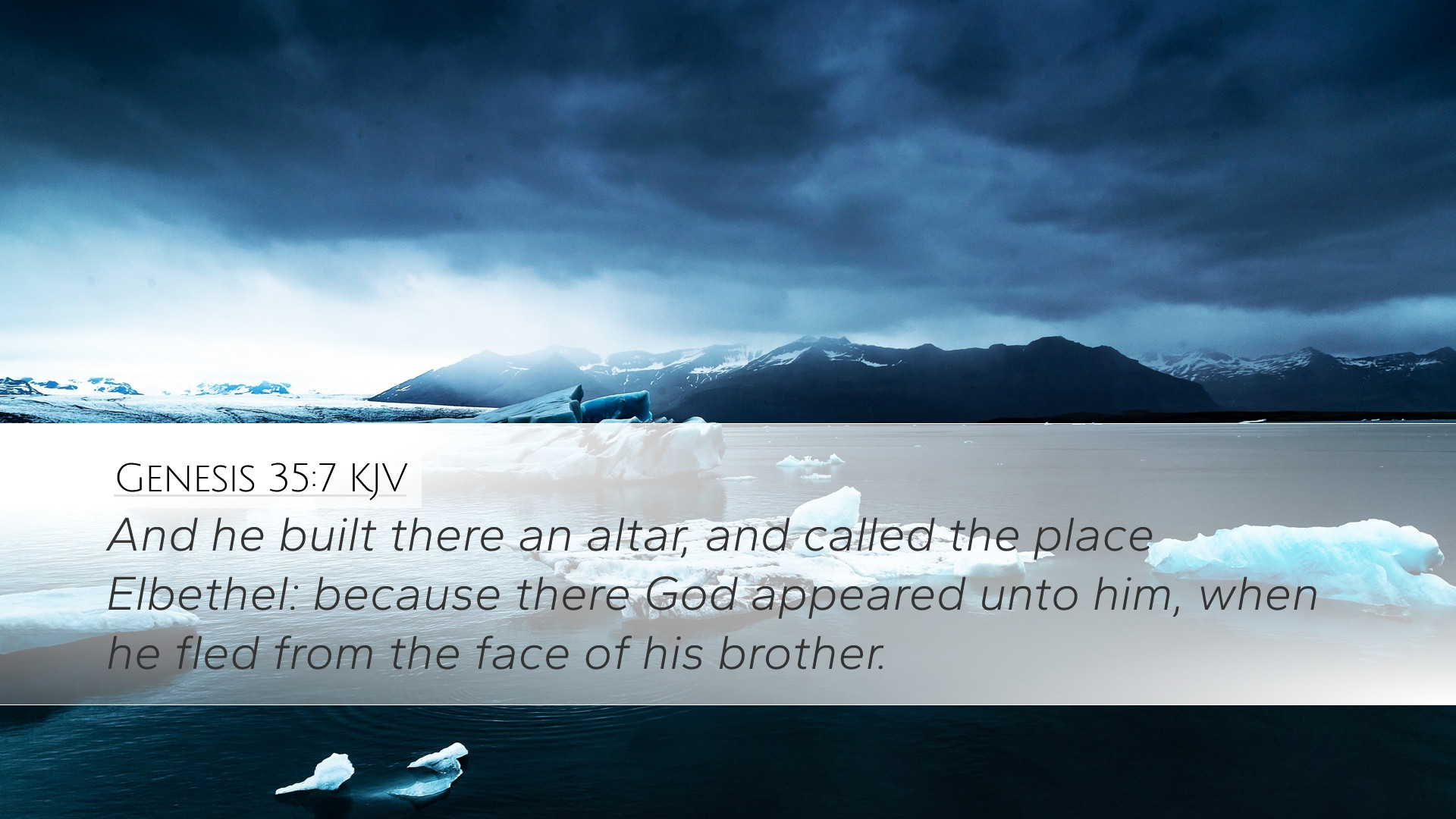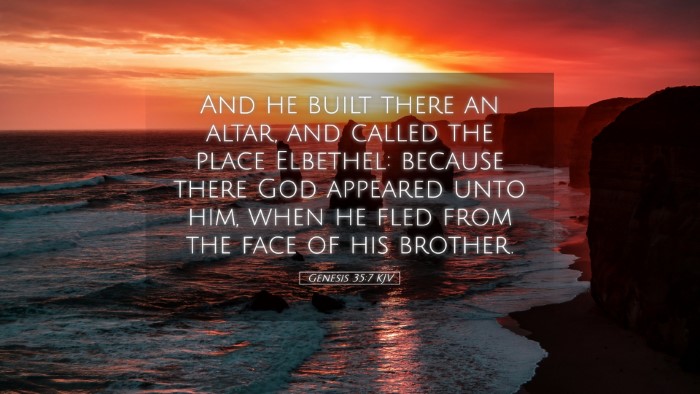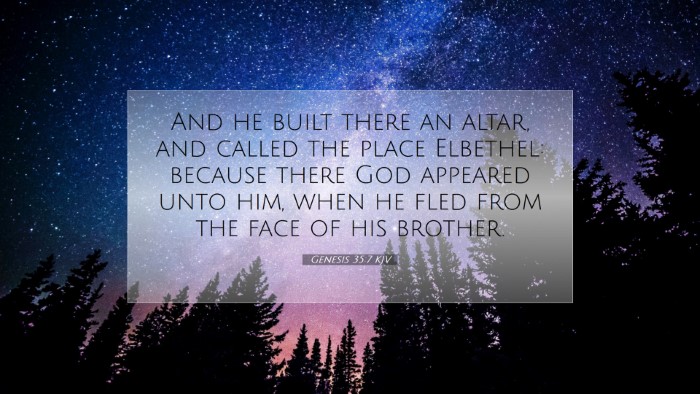Commentary on Genesis 35:7
Verse Reference: Genesis 35:7 - "And he built there an altar, and called the place Elbethel: because there God appeared unto him when he fled from the face of his brother."
Introduction
The significance of Genesis 35:7 emerges from Jacob’s return to Bethel, a pivotal moment that encapsulates themes of divine encounter, renewal, and the covenantal relationship between God and His chosen people. This commentary draws upon various public domain sources to provide a comprehensive analysis suitable for pastors, students, theologians, and scholars.
The Context of Jacob’s Journey
Leading into this verse, Jacob's life is characterized by turmoil and divine encounters. He fled from Esau after obtaining the birthright and blessing. Following a period of personal transformation, he is now commanded by God to return to Bethel.
- Matthew Henry: Emphasizes the importance of returning to the places where God has previously manifest His presence, indicating a spiritual journey of retracing one's steps to encounter God again.
- Albert Barnes: Notes that the return signifies a recognition of God's past guidance, highlighting that Bethel was a place of initial divine encounter (Genesis 28:12-22).
- Adam Clarke: Observes Jacob's recognition of God's sovereignty in his life, particularly upon returning to the sites where God made His promises.
The Act of Building the Altar
The act of constructing an altar at Bethel is deeply symbolic, representing worship, remembrance, and dedication. Altars serve as physical testimonies to spiritual experiences with God.
- Matthew Henry: Explores the significance of altars in biblical worship, suggesting that Jacob’s altar symbolizes a dedication of his life and family to God following a transformative journey.
- Albert Barnes: Argues that the altar not only memorializes the divine encounter but also serves as a public declaration of faith, reinforcing the commitment to God.
- Adam Clarke: Further explains that the name Jacob gives to the place, Elbethel, translates to “God of Bethel,” emphasizing that the worshiper recognizes both the sanctity of the place and God's ongoing relationship with him.
The Naming of the Place: Elbethel
The term "Elbethel" indicates a profound understanding of God’s character as both the God of the dwelling place and the God of personal revelation. Jacob’s renaming of the location reflects a deeper relational aspect he experienced with God.
- Matthew Henry: Notes that naming signifies ownership and identity; by naming the area Elbethel, Jacob is establishing a connection between God and this sacred place.
- Albert Barnes: Suggests that the name change indicates a transition from mere geographical importance to a personal and spiritual understanding of God.
- Adam Clarke: Emphasizes the duality of God's presence in both the divine and the locality, highlighting how Jacob's recognition is critical in his spiritual formation.
Reflection on God’s Presence
Jacob's experience of God's appearance at Bethel underscores the theme of divine revelation. The text invites readers to consider how God manifests Himself at significant moments in their lives.
- Matthew Henry: Encourages believers to recall their own experiences of God’s presence, emphasizing that such moments strengthen faith and commitment to God.
- Albert Barnes: Points out that God’s appearance is not casual but rather intentional, indicating God’s purpose to restore and reaffirm His covenant with Jacob.
- Adam Clarke: Reflects on the notion that God’s appearances are often tied to transitions in life, urging readers to be attentive to divine communication during pivotal changes.
The Theological Implications
This verse encapsulates significant theological truths about worship, remembrance, and the nature of God as a covenant partner:
- Exploration of Worship: Building an altar is an act of worship, reinforcing the understanding that worship is a holistic experience involving gratitude, acknowledgment of God's past actions, and a commitment to future obedience.
- Covenant Relationship: Jacob's interaction with God affirms the enduring nature of God’s promises. Bethel serves as a reminder of God's faithfulness across generations, encouraging believers to reflect on their covenantal relationship with Him.
- God's Revealed Character: The name Elbethel emphasizes God’s dual role as both a sacred place and a divine being who engages personally with His followers, inviting deeper faith and trust.
Practical Applications
The insights from Genesis 35:7 provide valuable lessons for contemporary believers:
- Returning to God: Just as Jacob returned to Bethel, believers are called to return to God in times of need, recommitting themselves to His purposes.
- Building Altars of Remembrance: Establishing personal “altars”—whether physical, spiritual, or communal—can serve as markers of faith along life’s journey.
- Recognizing Divine Encounters: Encouraging individuals to reflect on their own experiences of God’s presence fosters a deeper intimacy with Him and strengthens community among believers.
Conclusion
Genesis 35:7 presents a rich tapestry of theological significance and practical implications. By studying this verse through the lenses provided by Matthew Henry, Albert Barnes, and Adam Clarke, believers are reminded of the importance of remembering God's faithfulness, the sacredness of worship, and the deepening of the covenant relationship with God. As Jacob’s experience continues to inspire, may we also seek to encounter God anew and respond with heartfelt devotion.


